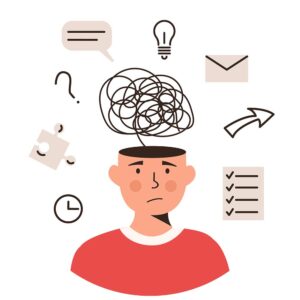Do you know someone with ADHD? If so, you may be wondering how it affects them. People with hyper-focused ADHD can focus intensely on certain tasks for extended periods. This can be a great asset in some situations, but it can also lead to problems if they become too focused on the wrong thing. In this blog post, we will discuss some of the things that you must know about hyper-focused ADHD.
Contents
What Is Hyper-Focused ADHD?
 Hyper-focused ADHD is a form of attention deficit hyperactivity disorder (ADHD) that is characterized by an extreme level of focus and concentration. Individuals with this condition are often able to complete tasks more quickly and accurately than those without ADHD.
Hyper-focused ADHD is a form of attention deficit hyperactivity disorder (ADHD) that is characterized by an extreme level of focus and concentration. Individuals with this condition are often able to complete tasks more quickly and accurately than those without ADHD.
However, they may also have difficulty transitioning from one task to another and may become easily frustrated when interrupted. It is often a challenge for individuals with this condition to multi-task or switch between tasks.
This type of ADHD can be both a blessing and a curse. On one hand, the ability to hyper-focus can be an asset in school or work settings. However, on the other hand, it can make social situations and everyday life more challenging. For instance, a child with hyper-focused ADHD may have trouble interacting with other kids at recess or at a party.
If you think you or your child may have hyper-focused ADHD, it is important to talk to a doctor or mental health professional. They can help make a diagnosis and develop a treatment plan that meets your needs.
How Does It Look Like?
Hyper-focused ADHD is different for everyone, it is not always easy to spot. However, there are some common signs and symptoms that may be present. But these are different for adults and children. Inattention, impulsivity, and hyperactivity are the main symptoms of ADHD. However, people with hyper-focused ADHD may only have inattention.
In adults
This is because, for children, impulsivity and hyperactivity are more common and easier to spot. In adults, hyper-focused ADHD may not be as easily noticeable. The main symptom of inattention is the inability to focus on one task for a long period. This can result in poor work performance, problems with completing tasks, and difficulties paying attention in conversations.
For example, an adult with hyper-focused ADHD may be able to sit and work on a project for hours, but not be able to focus on a conversation for more than a few minutes. Or they may have trouble completing tasks because they are easily distracted. It manifests differently in every individual.
In children
Children with hyper-focused ADHD may appear to be daydreaming or spacey. They may have trouble following instructions and may seem forgetful. They may also fidget or squirm a lot, and have trouble sitting still for long periods of time. Hyper-focused ADHD can also cause problems at home and at school.
It can make it hard for a child to pay attention in class, complete homework assignments, and get along with other kids. It can also lead to problems at home, such as not being able to follow through on chores or obey rules. Let’s take an example. A child with hyper-focused ADHD tries to complete a school project but may get sidetracked and start working on something else instead. This can make it hard to finish the project on time.
So these are some ways that hyperfocused ADHD looks like in children. If you think your child may have this type of ADHD, it’s important to talk to a doctor or mental health professional. They can help make a diagnosis and develop a treatment plan. Also, you must know that there is no one-size-fits-all approach to treating ADHD. The best treatment plan will be tailored to your child’s individual needs.
What Causes Hyperfocused ADHD?
 There are many possible causes of hyperfocused ADHD. Some of the common causes include:
There are many possible causes of hyperfocused ADHD. Some of the common causes include:
- A family history of ADHD or other mental health disorders
- Exposure to toxins or environmental pollutants
- Certain medical conditions such as sleep apnea or Tourette’s syndrome
- Stressful life events such as trauma or abuse
While the exact cause of hyperfocused ADHD is unknown, it is thought to be a combination of genetic and environmental factors. A person should be evaluated by a qualified mental health professional to rule out other possible causes of their symptoms.
Because this can be a chronic and lifelong condition, it is important to seek treatment early. There are many effective treatments available that can help people with ADHD manage their symptoms and improve their quality of life.
Can Hyperfocused ADHD Be Beneficial?
It seems a contradiction, but some people with ADHD may focus too much on one thing. They become so engrossed in an activity that everything else falls away. This can be a good thing if the activity is constructive, like playing a musical instrument or working on a challenging project.
But it can also lead to problems if the person becomes fixated on something harmful, like gambling or using drugs. Hyperfocused ADHD can cause a person to become so engrossed in an activity that they lose track of time and neglect their responsibilities.
This can be detrimental to their work, school, and personal life. People with this type of ADHD need to find a balance between their interests and their obligations. The benefits of this can be life-changing, but it can be difficult to maintain.
For example, if you’re a student with ADHD, you might be so focused on your studies that you neglect your social life. Or, if you’re an artist with ADHD, you might become so engrossed in your work that you forget to eat or sleep.
Hyperfocused ADHD can be both a blessing and a curse. It’s important to find a balance between your interests and your responsibilities. If you think you might have this type of ADHD, talk to a doctor or mental health professional. They can help you learn how to manage your symptoms and live a healthy, productive life.
How Is It Diagnosed?
The diagnosis of hyperfocused ADHD can be difficult because it overlaps with other disorders, such as OCD, anxiety, and depression. A comprehensive evaluation by a qualified mental health professional is necessary to rule out these other possibilities.
In addition to a clinical interview, the practitioner will likely administer one or more standardized tests. These might include the Conners’ Parent and Teacher Rating Scales, the ADHD Rating Scale, and the Vanderbilt ADHD Diagnostic Parent Rating Scale.
The practitioner will also consider any available information from school personnel, such as teachers and guidance counselors. A complete picture of the individual’s symptoms and functioning across different settings is essential for making an accurate diagnosis.
If the individual does not have another disorder that could account for the symptoms, and if the symptoms are having a significant impact on functioning, a diagnosis of hyperfocused ADHD is warranted. So seek out professional help because it might be difficult to diagnose.
How Can Hyper-Focused ADHD Be Treated?
 There is no “cure” for ADHD, but there are many effective treatments available. The most common approach is medication, which can be very helpful in reducing symptoms. However, medication is not the only option. Other treatments include:
There is no “cure” for ADHD, but there are many effective treatments available. The most common approach is medication, which can be very helpful in reducing symptoms. However, medication is not the only option. Other treatments include:
Behavioral therapy
Behavioral therapy is a type of therapy that helps people with ADHD change their behavior. It can be very effective in treating ADHD, especially when combined with medication. This type of therapy is usually provided by a psychologist or other mental health professional. It aims at helping people with ADHD learn how to better manage their symptoms and improve their functioning.
For example, behavioral therapy may help people with ADHD learn how to:
- Stay on task
- Follow directions
- Organize their thoughts
- Control their impulses
- Manage their time
Behavioral therapy can be provided in individual, group, or family sessions. It is important to find a therapist who has experience treating people with ADHD.
Parent training and education
Parent training and education is a type where parents learn about how to best manage their child’s ADHD. This can be done through group classes or one-on-one sessions with a professional. The goal is to help parents understand their child’s disorder and how to better communicate with them.
In fact, it is often recommended that both parents and children receive therapy or counseling to learn how to cope with ADHD. This is because those with the disorder often have difficulty in social situations. Counseling can help them learn how to better interact with others.
School-based interventions
School-based interventions are important for students with hyperactive ADHD. These can include things like:
- Behavior modification
- Organizational skills training
- Academic accommodations
This can be really helpful for students who are struggling in school. It can help them to stay on track and get the support they need.
Psychotherapy
It is considered that psychotherapy is one of the most effective treatments for ADHD. This is because it can help people with ADHD to learn how to control their thoughts and emotions. In addition, psychotherapy can also help people with ADHD to understand their condition and how it affects their lives. There are many different types of psychotherapy, but the most common type of psychotherapy for ADHD is cognitive-behavioral therapy.
CBT works by helping people with ADHD to change their negative thoughts and behaviors. It is very effective in treating ADHD. In one study, it was found that CBT is more effective than medication in treating ADHD.
Support groups
 People with ADHD often feel isolated and alone. Joining a support group can help you connect with others who understand what you’re going through. Support groups provide a safe place to share your experiences and frustrations, and to get advice and support from others.
People with ADHD often feel isolated and alone. Joining a support group can help you connect with others who understand what you’re going through. Support groups provide a safe place to share your experiences and frustrations, and to get advice and support from others.
There are many online and offline support groups for people with ADHD. To find a support group in your area, contact your local mental health association or search online for an “ADHD support group.” This can be a great way to meet other people with ADHD and learn more about the condition.
Self-help
This should be a priority for people with hyper-focused ADHD because it can help lessen the symptoms and provide a better quality of life. It can be as simple as adding structure to your day or learning how to meditate. There are many wonderful resources out there to help you get started.
Some common things that you can do to help yourself are:
- Create a daily routine and stick to it as much as possible
- Set goals for yourself and break them down into manageable tasks
- Exercise regularly
- Eat a healthy diet
- Get enough sleep
- Limit your exposure to electronics and stimulants
With these tips and some help from professionals, you can start to take control of your hyper-focused ADHD and improve your life. However, if you are feeling overwhelmed, please reach out for help. Many people understand what you are going through and can offer support. You don’t have to go through this alone.
Conclusion
To conclude, hyper-focused ADHD is a real thing and it can be very debilitating if not properly managed. In simple words, it is when someone with ADHD is so focused on one thing that they become oblivious to everything else around them. It can be a struggle to live with but it is possible to manage it with the help of a professional.
Therefore, if you feel like you may have hyper-focused ADHD, it is important to reach out to a professional for help. They will be able to provide you with the resources and support you need to manage your condition.
For more tips and guidance, you can reach out to Therapy Mantra. The team of professional counselors is more than happy to help you in your journey to recovery. Contact us today to learn more about our services. You can also book an online therapy session or download our free Android or iOS app.


